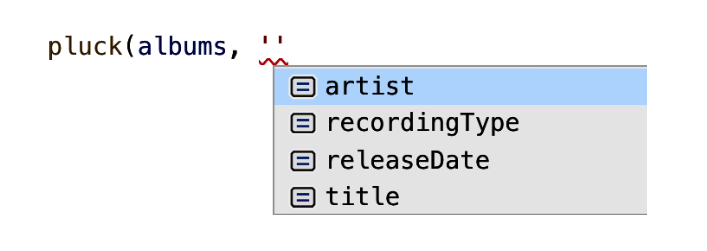第 35 条: 使用更精确的替代方案代替字符串类型
要点
- 避免“stringly typed”(大量使用宽泛字符串)代码,尽量用更合适的类型,而不是让任何字符串都成为可能。
- 如果一个变量的取值域更准确地用字符串字面量联合类型表示,就优先用联合类型代替宽泛的
string,这样能让类型检查更严格,也让开发体验更好。 - 对于期望传入对象属性名的函数参数,优先用
keyof T代替string。
正文
还记得第 7 条提到的“类型的值域”吗?意思是某个类型可以接受的所有值的集合。比如 string 类型的值域非常大,"x" 和 "y" 属于它,但《白鲸记》整本书的文本(开头是 “Call me Ishmael...”,大约有 120 万个字符)也属于它。
所以当你声明一个 string 类型的变量时,你应该想一想:有没有更具体、更窄的类型会更合适?
比如你正在做一个音乐收藏系统,需要定义一个专辑(album)的类型,可以这样尝试:
interface Album {
artist: string
title: string
releaseDate: string // YYYY-MM-DD
recordingType: string // E.g., "live" or "studio"
}接口中大量使用 string 类型,以及用注释来补充类型信息(参考第 31 条),这两个信号都强烈说明这个接口设计可能不太合理。以下是可能出错的地方:
const kindOfBlue: Album = {
artist: 'Miles Davis',
title: 'Kind of Blue',
releaseDate: 'August 17th, 1959', // Oops!
recordingType: 'Studio', // Oops!
} // OK比如 releaseDate 字段的格式和注释里要求的不一样,而 studio 的值应该是小写,却写成了大写的 'Studio'。但因为它们都是字符串,这个对象依然可以赋值给 Album 类型,TypeScript 的类型检查器也不会报错。
即使对象本身是合法的 Album,这种宽泛的 string 类型也可能掩盖一些错误。比如:
function recordRelease(title: string, date: string) {
/* ... */
}
recordRelease(kindOfBlue.releaseDate, kindOfBlue.title) // OK, should be error在调用 recordRelease 时,两个参数的位置写反了,但因为它们都是字符串,类型检查器也不会报错。正因为这种情况经常发生,所以人们把这种大量依赖字符串的代码叫做 “stringly typed”。
你能否通过缩小类型范围来避免这类问题?比如说,虽然把整本《白鲸记》当作歌手名或专辑名有点夸张,但理论上是说得通的,所以 artist 和 title 字段使用 string 类型是合适的。
但是 releaseDate 字段最好用 Date 对象,这样可以避免格式错误的问题。
至于 recordingType 字段,可以定义成只有两个值的联合类型(你也可以用枚举类型,但我通常建议避免使用它;详见第 72 条):
type RecordingType = 'studio' | 'live'
interface Album {
artist: string
title: string
releaseDate: Date
recordingType: RecordingType
}通过这些修改,TypeScript 就能更严格地检查错误了。
const kindOfBlue: Album = {
artist: 'Miles Davis',
title: 'Kind of Blue',
releaseDate: new Date('1959-08-17'),
recordingType: 'Studio',
// ~~~~~~~~~~~~ Type '"Studio"' is not assignable to type 'RecordingType'
}这种做法的好处不只是类型检查更严格。
首先,显式地定义类型可以确保它的含义在传来传去的过程中不会丢失。比如你想找出某种特定录音类型(recordingType)的专辑,可能会写这样一个函数:
function getAlbumsOfType(recordingType: string): Album[] {
// ...
}那调用这个函数的人怎么知道 type 应该传什么?虽然实际只支持 'studio' 或 'live',但类型是 string,没法明确表达这个约束。而解释这些值含义的注释藏在 Album 类型的定义里,调用者可能根本不会去看。
其次,显式定义类型还能让你为它写文档(详见第 68 条),提升可读性和维护性。
/** What type of environment was this recording made in? */
type RecordingType = 'live' | 'studio'当你把 getAlbumsOfType 的参数类型从 string 改为 RecordingType 后,调用这个函数的人就可以点进去查看 RecordingType 的文档了(见图 4-1)。

另一个常见的字符串误用场景是在函数参数中。
比如你想写一个函数,从一个对象数组中提取某个字段的所有值。Underscore 和 Ramda 这样的工具库把这个函数叫做 pluck。
function pluck(records, key) {
return records.map((r) => r[key])
}那你该怎么给这个函数写类型呢?下面是一个最初的尝试:
function pluck(records: any[], key: string): any[] {
return records.map((r) => r[key])
}虽然这样写类型检查不会报错,但效果很差。特别是返回值的 any 类型,会带来很多问题(详见第 43 条)。
改进这个类型签名的第一步,是引入一个泛型类型参数:
function pluck<T>(records: T[], key: string): any[] {
return records.map((r) => r[key])
// ~~~~~~ Element implicitly has an 'any' type
// because type '{}' has no index signature
}TypeScript 现在会提示:key 的类型是 string 太宽泛了。而这个提示是对的 —— 如果你传入的是 Album 类型的数组,那 key 实际上只能是 "artist"、"title"、"releaseDate" 或 "recordingType",而不是任意字符串。
这正是 keyof Album 类型要表达的意思 —— 它表示 Album 类型所有属性名组成的联合类型。
type K = keyof Album
// ^? type K = keyof Album
// (equivalent to "artist" | "title" | "releaseDate" | "recordingType")所以解决办法就是把 string 替换成 keyof T:
function pluck<T>(records: T[], key: keyof T) {
return records.map((r) => r[key])
}这个版本可以通过类型检查,而且我们还让 TypeScript 自动推断返回类型。那么推断得怎么样呢?如果你在编辑器里把鼠标悬停在 pluck 上,看到的返回类型是:
function pluck<T>(record: T[], key: keyof T): T[keyof T][]这个类型表示:T 中任意字段的值组成的数组。换句话说,可能是 T 里任何字段的值类型。
但如果你只传入了一个确定的字符串作为 key,这个推断就太宽泛了。例如:
const releaseDates = pluck(albums, 'releaseDate')
// ^? const releaseDates: (string | Date)[]返回类型应该是 Date[],而不是 (string | Date)[]。虽然 keyof T 比 string 要窄很多,但仍然不够精确。
要进一步缩小类型范围,我们需要引入第二个类型参数,这个参数是 keyof T 的子类型,通常是某个具体的属性名:
function pluck<T, K extends keyof T>(records: T[], key: K): T[K][] {
return records.map((r) => r[key])
}现在类型签名就完全正确了。我们可以通过不同的调用方式来验证这一点:
const dates = pluck(albums, 'releaseDate')
// ^? const dates: Date[]
const artists = pluck(albums, 'artist')
// ^? const artists: string[]
const types = pluck(albums, 'recordingType')
// ^? const types: RecordingType[]
const mix = pluck(albums, Math.random() < 0.5 ? 'releaseDate' : 'artist')
// ^? const mix: (string | Date)[]
const badDates = pluck(albums, 'recordingDate')
// ~~~~~~~~~~~~~~~
// Argument of type '"recordingDate"' is not assignable to parameter of type ...语言服务还能根据 Album 的键提供自动补全功能(如图 4-2 所示)。

string 类型和 any 有些类似的问题:用得不恰当时,它允许无效的值出现,还会隐藏类型之间的关系。这会干扰类型检查器,掩盖真实的 bug。
TypeScript 能定义字符串的子集,这是给 JavaScript 代码带来类型安全的强大手段。使用更精确的类型,不仅能捕获错误,还能提升代码的可读性。
本条重点讲的是有限集合的字符串,但 TypeScript 也支持建模无限集合,比如所有以 "http:" 开头的字符串。这种情况可以用模板字面量类型,详见第 54 条。
关键点总结
- 避免“stringly typed”(大量使用宽泛字符串)代码,尽量用更合适的类型,而不是让任何字符串都成为可能。
- 如果一个变量的取值域更准确地用字符串字面量联合类型表示,就优先用联合类型代替宽泛的
string,这样能让类型检查更严格,也让开发体验更好。 - 对于期望传入对象属性名的函数参数,优先用
keyof T代替string。